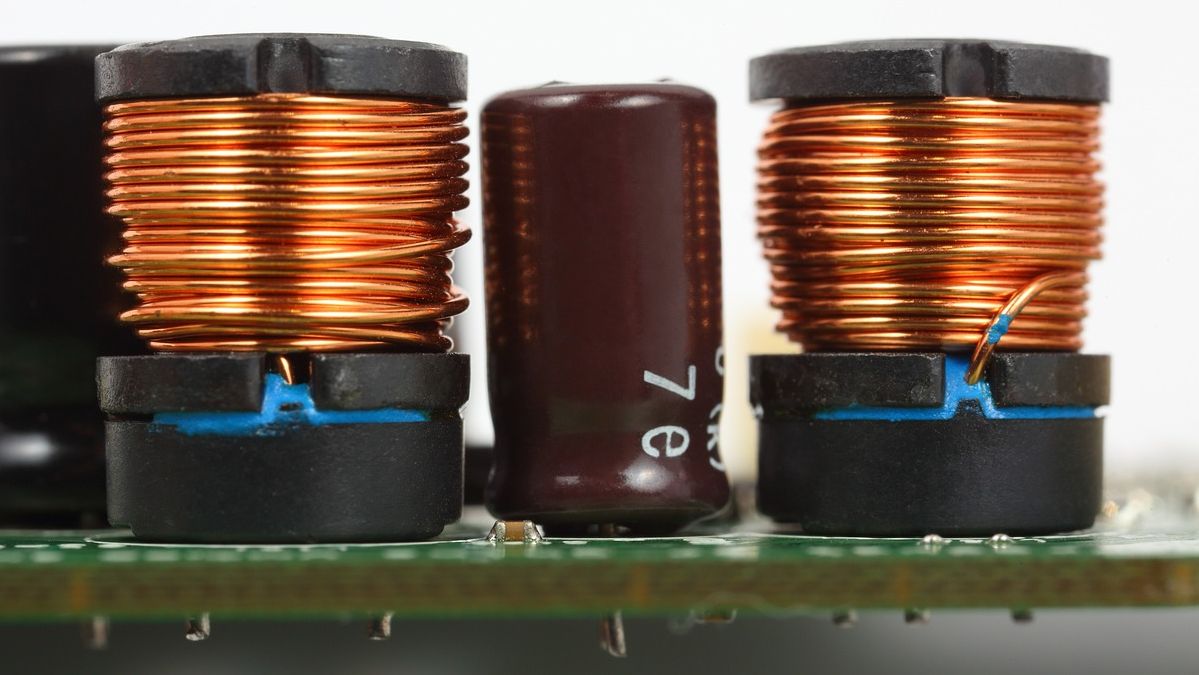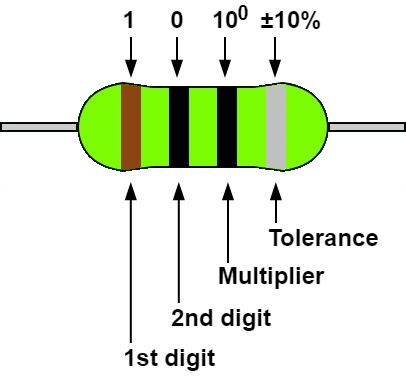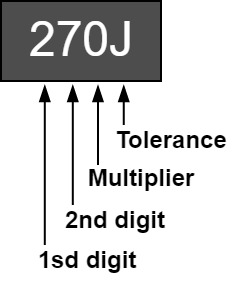How to Read Inductance Values

This article details how to read the inductance values of inductors.
E series
Inductance values are determined along the E series as follows.
The "E" in the E series stands for exponent, and the E12 series is completed by inserting the numbers 0 to 11 (12 numbers) into the "n" of the E12 series.
For inductors with an tolerance of ±10[%], using the E12 series values, 10[uH] is 9 to 11[uH], 12[uH] is 10.8 to 13.2[uH], and 15[uH] is 13.5 to 16.5[uH], so that the tolerance ranges overlap.
For resistors, the E12 series is often used, but for inductors, the E6 or E12 series is often used.
E6/E12/E24 series
| E6 ±20% $\sqrt[6]{10^n}$ | E12 ±10% $\sqrt[12]{10^n}$ | E24 ±5% $\sqrt[24]{10^n}$ |
|---|---|---|
| 1.0 | 1.0 | 1.0 |
| 1.1 | ||
| 1.2 | 1.2 | |
| 1.3 | ||
| 1.5 | 1.5 | 1.5 |
| 1.6 | ||
| 1.8 | 1.8 | |
| 2.0 | ||
| 2.2 | 2.2 | 2.2 |
| 2.4 | ||
| 2.7 | 2.7 | |
| 3.0 | ||
| 3.3 | 3.3 | 3.3 |
| 3.6 | ||
| 3.9 | 3.9 | |
| 4.3 | ||
| 4.7 | 4.7 | 4.7 |
| 5.1 | ||
| 5.6 | 5.6 | |
| 6.2 | ||
| 6.8 | 6.8 | 6.8 |
| 7.5 | ||
| 8.2 | 8.2 | |
| 9.1 |
Color Code(Axial Lead Inductor)

Axial lead inductors are indicated by a color that represents a number as shown below.
Color Code
| Color | 1st digit | 2nd digit | Multiplier | Tolerance |
|---|---|---|---|---|
| Black | 0 | 0 | $10^0$ | - |
| Brown | 1 | 1 | $10^1$ | ±1[%] |
| Red | 2 | 2 | $10^2$ | ±2[%] |
| Orange | 3 | 3 | $10^3$ | ±0.05[%] |
| Yellow | 4 | 4 | $10^4$ | ±0.02[%] |
| Green | 5 | 5 | $10^5$ | ±0.5[%] |
| Blue | 6 | 6 | $10^6$ | ±0.25[%] |
| Purple | 7 | 7 | $10^7$ | ±0.1[%] |
| Gray | 8 | 8 | $10^8$ | ±0.01[%] |
| White | 9 | 9 | $10^9$ | - |
| Gold | - | - | $10^{-1}$ | ±5[%] |
| Silver | - | - | $10^{-2}$ | ±10[%] |
| None | - | - | - | ±20[%] |
Some mnemonics that are easy to remember:
Easy to remember of color code
| Color | Number | First Letter |
|---|---|---|
| Black | 0 | Black |
| Brown | 1 | Brown |
| Red | 2 | Red |
| Orange | 3 | Orange |
| Yellow | 4 | Yellow |
| Green | 5 | Green |
| Blue | 6 | Blue |
| Purple | 7 | Purple |
| Gray | 8 | Gray |
| White | 9 | White |
| Gold | - | |
| Silver | - | |
| None | - |
Easy to remember
Big Boys Race Our Young Girls But Violet Generally Wins.
Better Be Right Or Your Great Big Venture Goes West.
Beetle Bailey Runs Over Your General Before Very Good Witnesses.
Beach Bums Rarely Offer You Gatorade But Very Good Water.
Buster Brown Races Our Young Girls But Violet Generally Wins.
Better Be Right Or Your Great Big Vacation Goes Wrong.
Better Be Right Or Your Great Big Values Go Wrong.
Better Be Right Or Your Great Big Plan Goes Wrong. (with P = Purple for Violet)
Back-Breaking Rascals Often Yield Grudgingly But Virtuous Gentlemen Will Give Shelter Nobly. (with tolerance bands Gold, Silver or None)
Better Be Right Or Your Great Big Plan Goes Wrong - Go Start Now!
Black Beetles Running Over Your Garden Bring Very Grey Weather.
Bad Booze Rots Our Young Guts But Vodka Goes Well – get some now.
Bad Boys Run Over Yellow Gardenias Behind Victory Garden Walls.
Bat Brained Resistor Order You Gotta Be Very Good With.
Betty Brown Runs Over Your Garden But Violet Gingerly Walks.
Big Beautiful Roses Occupy Your Garden But Violets Grow Wild.
Big Brown Rabbits Often Yield Great Big Vocal Groans When Gingerly Slapped Needlessly.
Black Bananas Really Offend Your Girlfriend But Violets Get Welcomed.
Black Birds Run Over Your Gay Barely Visible Grey Worms.
Badly Burnt Resistors On Your Ground Bus Void General Warranty.
Billy Brown Ran Out Yelling Get Back Violets Getting Wet.
Better Be Right Or You're Gonna Be Violently Gouged With Golden Spaghetti.
Bright Boys Rave Over Young Girls But Veto Getting Wed.
Black Bears Raid Our Yellow Green Bins Violently Grabbing Whatever Goodies Smell Nice.
Bad Bears Raid Our Yummy Grub But Veto Grey Waffles.
Bachelor Boys Rush Our Young Girls But Veronica Goes Wild for Gold or Silver Necklaces.
List of electronic color code mnemonics
Example:4 Band Inductor

- 1st digit:1(Brown)
- 2nd digit:0(Black)
- Multiplier:$10^0$(Black)
- Tolerance:±10[%](Silver)
- Inductance Value:$$10 \times 10^0[uH]=10[uH]±10[\%]$$
Axial lead inductors are often 4 band inductors.
Example:3 Band Inductor

- 1st digit:1(Brown)
- 2nd digit:0(Black)
- Multiplier:$10^0$(Black)
- Inductance Value:$$10 \times 10^0[uH]=10[uH]$$
Axial lead inductors can be 3 band inductors: error band is missing from 4 band inductors.
Digit Numbering

Chip inductors and radial lead inductors are indicated by numbers as follows. In addition to numbers, there are also special markings such as R (decimal point) and L (nH and decimal point).
Usually, "uH" is used as the standard.
Digit Numbering
| 1st digit | 2nd digit | Multiplier |
|---|---|---|
| 0 | 0 | $10^0$ |
| 1 | 1 | $10^1$ |
| 2 | 2 | $10^2$ |
| 3 | 3 | $10^3$ |
| 4 | 4 | $10^4$ |
| 5 | 5 | $10^5$ |
| 6 | 6 | $10^6$ |
| 7 | 7 | $10^7$ |
| 8 | 8 | $10^8$ |
| 9 | 9 | $10^9$ |
| R(Decimal Point) | R(Decimal Point) | - |
| N($10^{-9}$/Decimal Point) | N($10^{-9}$/Decimal Point) | N($10^{-9}$) |
The tolerance of inductors are marked by alphabets as follows.
Tolerance
| Alphabet | Tolerance |
|---|---|
| F | ±1[%] |
| G | ±2[%] |
| J | ±5[%] |
| K | ±10[%] |
| M | ±20[%] |
Simplified Inductor Chart
Simplified Inductor Chart
| Example | Inductance Value |
|---|---|
| 104 | 100[mH] |
| 103 | 10[mH] |
| 102 | 1[mH] |
| 101 | 100[uH] |
| 100 | 10[uH] |
| 1R0 | 1[uH] |
| R10 | 0.1[uH] |
| 10N | 10[nH] |
| 1N0 | 1[nH] |
Example:Chip Inductor etc.

- 1st digit:2
- 2nd digit:7
- Multiplier:$10^0$
- Tolerance:±5[%](J)
- Inductance Value:$$27 \times 10^0[uH]=27[uH]±5[\%]$$
Chip inductors and radial lead inductors are often marked with numbers. Tolerance is marked with alphabetic characters.

- 1st digit:4
- 2nd digit:7
- Multiplier:$10^0$
- Inductance Value:$$47 \times 10^0[uH]=47[uH]$$
Depending on the type of inductor, tolerance marking may be omitted.

- Decimal Point:R
- 1st digit:1
- 2nd digit:2
- Inductance Value:$$0.12[uH]$$
Read "R" as a decimal point. In this case, there is no multiplier marking.

- 1st digit:1
- Decimal Point:R
- 2nd digit:2
- Inductance Value:$$1.2[uH]$$
Read "R" as a decimal point. In this case, there is no multiplier marking.

- 1st digit:1
- 2nd digit:2
- 単位:N([uH]⇒[nH])
- Inductance Value:$$12[nH]$$
With the "N" marking at the end, the unit is [uH] => [nH].

- 1st digit:1
- Decimal Point:N
- 2nd digit:2
- 単位:N([uH]⇒[nH])
- Inductance Value:$$1.2[nH]$$
Since the "N" is between the numbers, the unit changes from [uH] ⇒ [nH] and also means a decimal point.